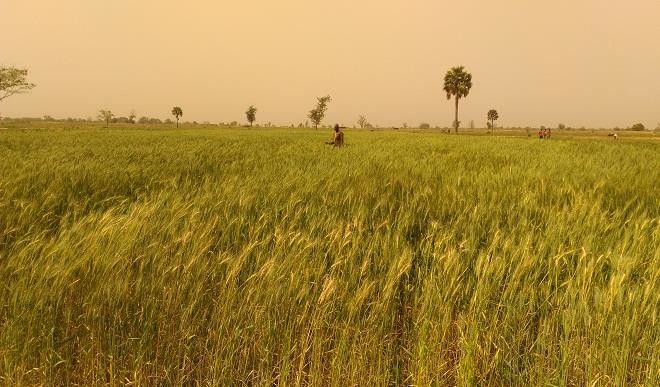Lack of incentives worry Bagwai wheat farmers
Bagwai town, the headquarters of Bagwai local government area of Kano, is one of the communities blessed with many enterprising farmers in the state. The comunity also has arable land and available water sources for irrigation in the dry season. Residents of the area, who are notable in the production of many food crops even […]


Bagwai town, the headquarters of Bagwai local government area of Kano, is one of the communities blessed with many enterprising farmers in the state.
The comunity also has arable land and available water sources for irrigation in the dry season.
Residents of the area, who are notable in the production of many food crops even in the dry season, ventured into cultivation of wheat about four years ago supplying thousands of tones of the product to markets across the state and beyond.
When Kano Chronicle visited the farming community recently, the fringes of Bagwai dam that used to be small farm lands for spices and vegetables has now been transformed into large plantation of wheat, with the crop at various stages of ripeness.
Farmers said their shift into wheat production was informed by the market demands of the product in recent times.
‘’You can recall that the crop is used for various industrial purposes, and because over time our local production of the crop has diminished significantly, there was acute scarcity of some of its by-products in the market like flour; as a result of that sometime last year, production of ordinary bread was almost halted for lack of wheat flour; so this among other reasons are responsible for this sudden change,’’ Alhaji Danliti Idris, one of the farmers said.
This expressed desire on the part of the farmers to key into the supply of the product for industrial use in the country, seems to be a response to the call by the government on Nigerians to embrace agriculture in order to diversify and liberate the economy from the cleavages of oil dependence.
However, for maximum results to be achieved in this regard, farmers need adequate incentives in form of loans and other inputs to improve their productivity which Kano Chronicle learnt was lacking in the area.
Speaking about the challenges, some of the farmers identified lack of incentives from the government as their major setback.
They said their production was hampered by lack of incentives from the government saying it had denied them access to modern farm inputs and equipment, thus limiting their output significantly.
‘’With no government involvement in our business, we could not access improved varieties or hybridized seeds; we could not access loan facilities and several other inputs which have significant importance in the general output’’ Danliti said.
He appealed to the government at both levels to absorb them in various agricultural schemes to enable them access loan facilities and other inputs; adding that it was the only way that the cultivation of wheat could be encouraged in the whole country to meet its market demand.
‘’We are pleading with government at both state and federal levels to consider our efforts in the wheat production as an attempt towards diversifying the economy. We equally need to be absorbed into all schemes that encouraged agriculture’’ he appealed.
Danliti, who hervested 44 bags of wheat in the last farming season from 1 acre of land, said he was expecting more than 60 bags of the product this year even as he could not expand his farm for financial constrain.
